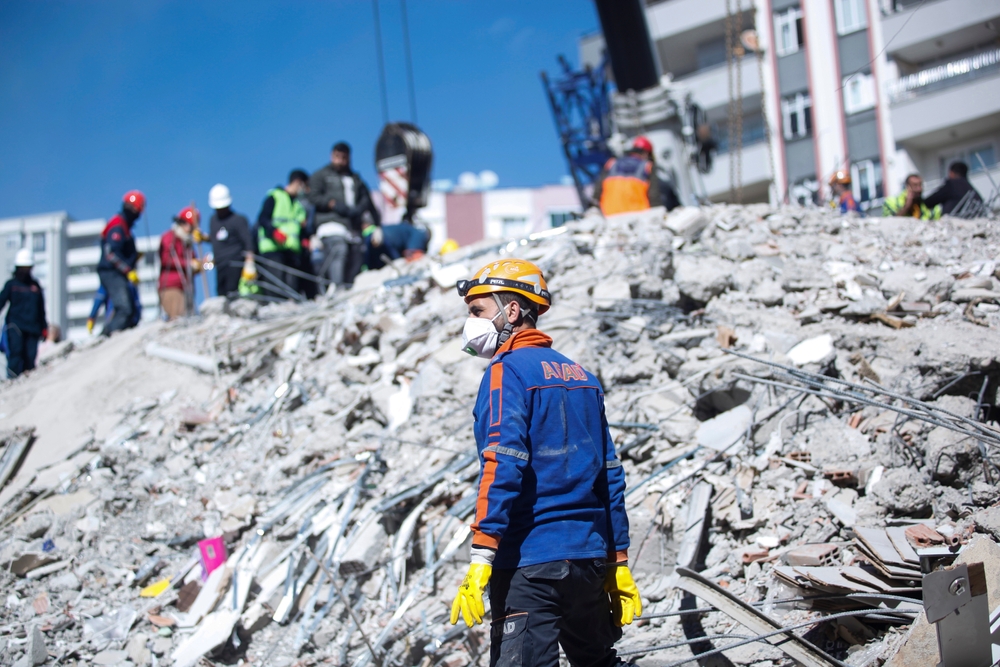On February 6, Southern Turkey and the regions of northern Syria were struck by the most violent earthquake in nearly a century reaching 7.8 on the Richter scale, killing of thousands of people and millions injured with millions more being displaced. This is added to the severe losses incurred on the infrastructure, leading to potential security breaches, represented in the growth of crime, the spread of criminal groups in earthquake zones, that are suffering from fragile security control. These security breaches may extend to the conflict between Turkey and the PKK, as well as Turkey’s involvement in the region’s conflicts.
Indications of Security Breaches
The areas affected by the earthquake are suffering escalating security breaches which were were revealed by the Turkish President, who vowed on February 11, to take measures against perpetrators of crime in the area affected by the earthquake. The director of the “Adalah” Center for Refugee Rights in Turkey, Ahmed Qatee’, also warned of the possibility of human trafficking gangs chasing and kidnapping children whether in Turkey or northern Syria, especially those who have not been identified.
Since February 11, some foreign rescue teams have suspended their participation in relief work and rescue efforts for the victims of the devastating earthquake that struck Turkey, and returned to the country due to what it called a “significant” security threat to its employees. For example, on February 12, United Hatsala, an Israeli relief organization, announced the suspension of its operations. On February 10, the Austrian army and German rescue crews issued a statement regarding the suspension of their relief efforts due to security concerns. The German “Assar” group reported “clashes between different groups” along the Syrian-Turkish border, and gunshots were fired.
The Potential Fallout
With the escalating fallout from the earthquake in Turkey and the preoccupation of the security forces in Turkey dealing with the fallout from the earthquake, there are several security impacts that can affect Turkey in the following way:
- Period of Peace with the PKK: Opportunities for calm between the Turkey and the Kurdistan Workers’ Party (PKK), which Turkey classifies as a “terrorist” organization, are expected to be high in the coming period. This move is supported by the PKK’s announcement on the eve of the earthquake for a temporary truce. The PKK also announced the temporary suspension of all its operations in Turkey, with the aim of concentrating all resources on rescue efforts. On February 10, Firat News Agency reported that the PKKs military official, Jamil Bayek, confirmed that there were orders not to carry out any operation in Turkish cities unless the party was attacked by Turkish forces. He added, “The earthquake caused a disaster, with thousands of our people under the rubble, this is the time for everyone to mobilize all their capabilities.”
Although there is no official Turkish comment on Bayek’s statements, it is expected that the AKP government will follow suit, to benefit from this announcement. Especially since the Turkish president is aware that de-escalation with the Kurds gives the AKP government and the Turkish army a greater opportunity to deal with the humanitarian crisis caused by the earthquake. On the other hand, the easing of tensions with the Kurds blocks the way for opponents to employ the Kurdish rhetoric and the systematic violence carried out by the Turkish state against the Kurds in southeastern Turkey during the electoral process scheduled for next May.
However, this state of calm is unlikely to last in the long run given that President Erdogan allowed the security services to use exceptional measures that allow them to clamp down on political activity in the Kurdish regions. On the other hand, the Peoples’ Democratic Party, the political wing of the Kurds, issued a statement, on February 9, accusing the Turkish government of “trying to protect itself instead of organizing an intervention and providing assistance to people.” The statement added: “What it should do is not declare a state of emergency, but rather establish a social alliance.”
- Heightening Security Precautions against Opposing Parties to the Government: The earthquake that struck Turkey, has increased the pressure on the Turkish government, reaching a peak with the growing criticism of relief operations. The Turkish president’s opponents at home are seeking to exploit the earthquake crisis to hinder his movements on the political front. This then raises the expectation that the Turkish government will, during the coming period, tighten security measures at home and adopt harsher security strategy, especially with those that are seeking to exploit the earthquake politically.
The Turkish Interior Minister’s assertion further gave proof of this intent as he stated on February 13 that the security services will stand in the face of anyone who tries to exploit the country’s ordeal. He added, “We will use the law to eliminate rumor-mongers through the state emergency powers. False news is more dangerous than a nuclear bomb, which the security forces will stand against.” Alongside the statements of the Interior Minister, the Turkish government ordered telecommunication service providers to block individuals’ access to Twitter, for fear that it could be used to spread “misleading information”.
It is expected that the ruling regime in Turkey will use the force and deterrence in confronting its political opponents, given the mounting criticism by the opposition parties, especially the Republican People’s Party, whose president, Kemal Kilicdaroglu, accused the Turkish government of “not preparing for an earthquake in 20 years.” He believed that if there is one person responsible for this, it is Erdogan. These accusations prompted Erdogan to turn to radio stations to complain about the emergence of politically motivated “fake news” trying to exploit the earthquake. Erdogan stated that: “We are closely watching those who intend to turn our people against each other with fake news and fabricated distortions. Today is not the time to enter into an argument with them, but we will do so only when the time is right.”
- The Spread of Criminal Groups: The spread of crime is explained by the fragility of the security apparatus in the areas affected by the earthquake, and the destruction of a significant part of their structure in these areas. This is helping to shed light on the mounting pressure on the Turkish government to control security in the provinces affected by the earthquake, as the the threat of criminal groups continues to grow. On February 14, the Turkish Ministry of Interior issued arrest warrants for 97 people on charges of looting in the earthquake-hit areas.
- Lessening Military Operations Abroad: Reducing involvement in the region’s conflicts seems acceptable to many, given the Turkish army’s preoccupation with the repercussions of the devastating earthquake. Erdogan gave orders to deploy nine thousand soldiers to assist in relief efforts, and declared a state of emergency for three months in the affected provinces. It is expected that the Turkish military operations in northern Syria will cease or at least reduce their operations to a minimum. Air raids launched by the Turkish army are most likely to be reduced in the regions of northern Iraq, especially after the PKK announced the cessation of its operations against Turkey.
On the Greek front, Turkey is expected to stop escalating the crisis with Greece, especially since the latter showed remarkable humanitarian efforts towards Turkey on the eve of the earthquake. In addition to food aid to the earthquake victims, it sent relief teams, as well as a visit by the Greek Foreign Minister on February 12 to Turkey. Perhaps this explains the statements of the Turkish Foreign Minister, who said on the eve of his recent meeting with his Greek counterpart: “We should not wait for another earthquake to improve our relations. I repeat this now as Turkey’s Foreign Minister, we must make further efforts to improve our relations.” He added, “A true friend appears in times of need,” this was in reference to Greece. Turkey is also aware that reducing the tensions with Greece represents a strategic gain for the Turkish side. This will ensure the resolution of outstanding issues with the Western powers that support Greece in the face of Turkish moves in the eastern Mediterranean and the Aegean Sea. In addition, this will help to deliver a message to the Turkish people that the AKP has a lot of political weight both on the international front and even amongst their adversaries.
- Using Force Against Syrian Refugees: The earthquake in Turkey and northern Syria coincided with the efforts by the AKP government to get rid of the refugees after they a burden on the Turkish economy, and on the other hand a pressure card used by the opposition in the elections. However, with the escalation regarding the possibility of a new wave of Syrian refugees affected by the earthquake to Turkey, the Turkish government expressed a rejection of this possibility and promised to use force against such attempts. This was further affirmed in the confirmation of Foreign Minister Mevlutoglu in his statements on stressing that “his country will not allow a new influx of refugees from Syria after the earthquake.” He further added, “We will facilitate humanitarian aid for the Syrians, but we will not allow a new influx of Syrian refugees. These are two separate issues.”
Neutralizing Pressures on Turkey
There are potential security repercussions that may result from the devastating earthquake in Turkey. This may prompt Turkey to adopt a stricter security approach and tighten security efforts to eliminate any threats that may arise in the coming period. The repercussions of the earthquake may contribute to easing tensions with the PKK, however, the use of force against the Turkish people and refugees may bear a high cost for the AKP given the coming elections in May.


